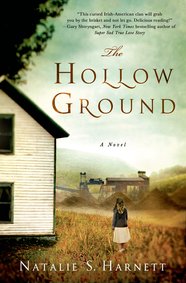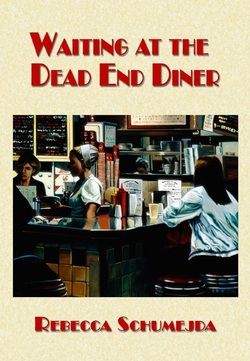
It's 1961, and after a family tragedy rocks her life, Brigid Howley, along with her mother, father, and little brother find themselves living with her strong-willed grandmother and sick grandfather. What follows this move, in Natalie S. Harnett's debut novel, The Hollow Ground, is a coming-of-age story set in the Anthracite region of Pennsylvania. Through a grisly discovery, young Brigid must not only come to terms with her fragile homelife, but her family's past as well.
What first attracted me to Harnett's novel was the setting. Set against the backdrop of the underground coal mines in eastern Pennsylvania, the very idea that the world could give out underneath the characters' feet at any moment (and does, in some scenes) adds to the tension in the story. Furthermore, the coal mining history is imperative to both the plot and the character development. Coal seems to seep through the very pores of the characters' skin and certainly, there are places in the book, where I know that the characters actually have coal veins in their bodies.
Still, as I read Harnett's book, I became so enveloped in the characters' lives, that I almost (I say almost because it is impossible to totally disregard the sense of place in this book) forgot the setting and instead focused on the characters' struggles, hopes and dreams. The main character, Brigid, is appealing -- sharp and brazen, she is determined to find her way through her sullen surroundings. In general, all the characters, both Brigid's family members and her friends, are flawed and not always likeable, but that makes them even more realistic in this gritty world.
Harnett's book is inspired by the underground mine fires of Centralia and Carbondale. I say inspired because the book starts in 1961, one year before the start and/or discovery of the Centralia fire. Thus, a reader who knows the history of this particular incident should not enter the novel thinking that the author is retelling the story of this specific coal fire. Instead, she is incorporating the symbolism of what an underground mine fire does -- devours silently, only flaring at times when the conditions are right.
A great first book by Natalie S. Harnett -- I am eager to see her follow up works. For more information on The Hollow Ground, see Harnett's website, which features samples and background information.
What first attracted me to Harnett's novel was the setting. Set against the backdrop of the underground coal mines in eastern Pennsylvania, the very idea that the world could give out underneath the characters' feet at any moment (and does, in some scenes) adds to the tension in the story. Furthermore, the coal mining history is imperative to both the plot and the character development. Coal seems to seep through the very pores of the characters' skin and certainly, there are places in the book, where I know that the characters actually have coal veins in their bodies.
Still, as I read Harnett's book, I became so enveloped in the characters' lives, that I almost (I say almost because it is impossible to totally disregard the sense of place in this book) forgot the setting and instead focused on the characters' struggles, hopes and dreams. The main character, Brigid, is appealing -- sharp and brazen, she is determined to find her way through her sullen surroundings. In general, all the characters, both Brigid's family members and her friends, are flawed and not always likeable, but that makes them even more realistic in this gritty world.
Harnett's book is inspired by the underground mine fires of Centralia and Carbondale. I say inspired because the book starts in 1961, one year before the start and/or discovery of the Centralia fire. Thus, a reader who knows the history of this particular incident should not enter the novel thinking that the author is retelling the story of this specific coal fire. Instead, she is incorporating the symbolism of what an underground mine fire does -- devours silently, only flaring at times when the conditions are right.
A great first book by Natalie S. Harnett -- I am eager to see her follow up works. For more information on The Hollow Ground, see Harnett's website, which features samples and background information.

 RSS Feed
RSS Feed
